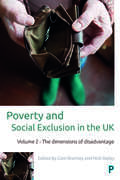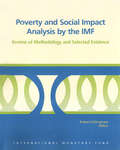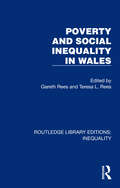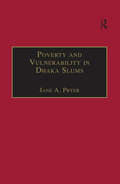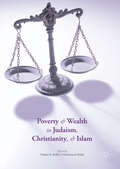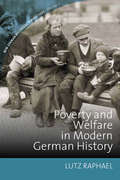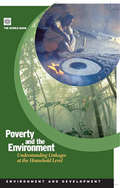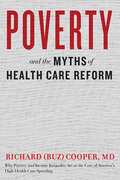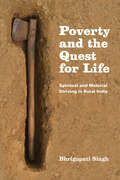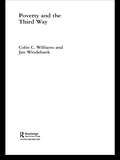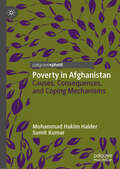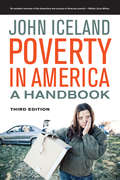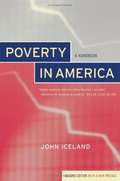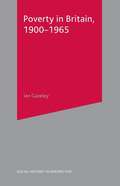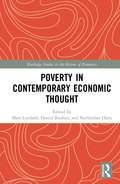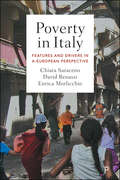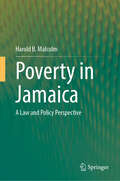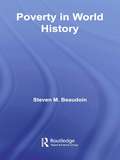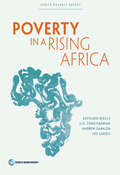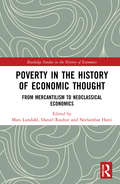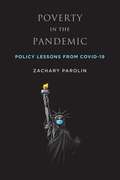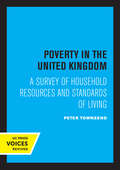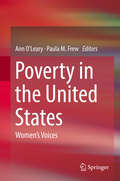- Table View
- List View
Poverty and Social Exclusion in the UK: Volume 2 - The Dimensions of Disadvantage
by Glen Bramley and Nick BaileyHow many people live in poverty in the UK, and how has this changed over recent decades? Are those in poverty more likely to suffer other forms of disadvantage or social exclusion? Is exclusion multi-dimensional, taking different forms for different groups or places? Based on the largest UK study of its kind ever commissioned, this fascinating book provides the most detailed national picture of these problems. Chapters consider a range of dimensions of disadvantage as well as poverty - access to local services or employment, social relations or civic participation, health and well-being. The book also explores relationships between these in the first truly multi-dimensional analysis of exclusion. Written by leading academics, this is an authoritative account of welfare outcomes achieved across the UK. A companion volume Poverty and Social Exclusion in the UK: Volume 1 focuses on specific groups such as children or older people, and different geographical areas.
Poverty and Social Impact Analysis by the IMF: Review of Methodology and Selected Evidence
by Robert GillinghamA report from the International Monetary Fund.
Poverty and Social Inequality in Wales (Routledge Library Editions: Inequality #7)
by Gareth Rees Teresa L. ReesOriginally published in 1980, this book presents a detailed empirical analysis of the key dimensions of inequality and poverty in Wales, discussing such aspects as the distribution of income and wealth, the housing situation, the functioning of the NHS and urban deprivation. Wales emerges as a country severely disadvantaged in relation to much of the rest of Britain. Moreover, the extent of inequalities within Wales is also striking. In the second part of the book each contributor applies a particular theoretical perspective to an aspect of the situation discussed in the first part. The perspectives adopted are diverse, ranging from Keynesianism, through dual labour markets to dependency theory and Marxist analysis. Each essay emphasises the importance of locating our understanding of poverty and social inequality in the context of the patterns of economic development in Wales and in the functioning of the State apparatus.
Poverty and Vulnerability in Dhaka Slums: The Urban Livelihoods Study
by Jane A. PryerBangladesh has low levels of urbanization but a high urban population in absolute terms, being one of the most densely populated countries in the world. Rapid urbanization in developing countries brings numerous problems and challenges; urban poverty is one important issue. This important volume presents the findings of a complex and revealing multidisciplinary cohort study conducted in the slums of Dhaka, Bangladesh. Detailed information was assembled on material, social and economic conditions, livelihoods, health and nutritional status. Together with associated qualitative work, the data forms the basis for understanding groups who are vulnerable to economic and environmental shocks and stresses, and for differentiating strategies which might be adaptive in situations of hardship and scarcity. The author examines many aspects of poverty and vulnerability including livelihoods, work disabling illness and coping strategies, the female workforce, women’s negotiation and well being, marital instability, child labour, and investments in health and nutrition, and utilizes the assembled material to debate on policy options.
Poverty and Wealth in Judaism, Christianity, and Islam
by Muhammad Shafiq Nathan R. KollarThis book gathers scholars from the three major monotheistic religions to discuss the issue of poverty and wealth from the varied perspectives of each tradition. It provides a cadre of values inherent to the sacred texts of Jews, Christians, and Muslims and illustrates how these values may be used to deal with current economic inequalities. Contributors use the methodologies of religious studies to provide descriptions and comparisons of perspectives from Judaism, Christianity, and Islam on poverty and wealth. The book presents citations from the sacred texts of all three religions. The contributors discuss the interpretations of these texts and the necessary contexts, both past and present, for deciphering the stances found there. Poverty and Wealth in Judaism, Christianity, and Islam identifies and details a foundation of common values upon which individual and institutional decisions may be made.
Poverty and Welfare in Modern German History (New German Historical Perspectives #7)
by Lutz RaphaelFor many, the history of German social policy is defined primarily by that nation’s postwar emergence as a model of the European welfare state. As this comprehensive volume demonstrates, however, the question of how to care for the poor has had significant implications for German history throughout the modern era. Here, eight leading historians provide essential case studies and syntheses of current research into German welfare, from the Holy Roman Empire to the present day. Along the way, they trace the parallel historical dynamics that have continued to shape German society, including religious diversity, political exclusion and inclusion, and concepts of race and gender.
Poverty and the Environment: Understanding Linkages at the Household Level
by World BankDrawing upon recent analytical work prepared inside and outside the World Bank, this report identifies key lessons concerning the linkages between poverty and the environment. With a focus on the contribution of environmental resources to household welfare, the analysis increases our understanding of how specific reforms and interventions can have an impact on the health and livelihoods of poor people. 'Scholars and development practitioners increasingly recognize that in low-income countries there are inextricable links between poverty reduction and natural resources management. Demand has grown immensely for not only more, but better empirical evidence on those links. This volume offers a careful synthesis of key findings from growing literature on the environmental determinants of household welfare, as reflected by indicators of consumption, health, and income. The primary contribution of this study is that is has drawn out vital policy conclusions that will be of value to organizations and governments concerned about poverty and the environment in the developing world.' --Professor Christopher B. Barrett, Cornell University
Poverty and the International Economic Legal System
by Krista Nadakavukaren ScheferWith a focus on how trade, foreign investment, commercial arbitration and financial regulation rules affect impoverished individuals, Poverty and the International Economic Legal System examines the relationship between the legal rules of the international economic law system and states' obligations to reduce poverty. The contributors include leading practitioners, practice-oriented scholars and legal theorists, who discuss the human aspects of global economic activity without resorting to either overly dogmatic human rights approaches or technocratic economic views. The essays extend beyond development discussions by encouraging further efforts to study, improve and develop legal mechanisms for the benefit of the world's poor and challenging traditionally de-personified legal areas to engage with their real-world impacts.
Poverty and the Myths of Health Care Reform
by Richard (Buz) CooperProof that high health care spending is linked directly to poverty.In Poverty and the Myths of Health Care Reform, Dr. Richard (Buz) Cooper argues that US poverty and high health care spending are inextricably entwined. Our nation's health care system bears a financial burden that is greater than in any other developed country in large part because impoverished patients use more health care, driving up costs across the board.Drawing on decades of research, Dr. Cooper illuminates the geographic patterns of poverty, wealth, and health care utilization that exist across neighborhoods, regions, and states—and among countries. He chronicles the historical threads that have led to such differences, examines the approaches that have been taken to combat poverty throughout US history, and analyzes the impact that structural changes now envisioned for clinical practice are likely to have. His research reveals that ignoring the impact of low income on health care utilization while blaming rising costs on waste, inefficiency, and unnecessary care has led policy makers to reshape clinical practice in ways that impede providers who care for the poor.The first book to address the fundamental nexus that binds poverty and income inequality to soaring health care utilization and spending, Poverty and the Myths of Health Care Reform is a must-read for medical professionals, public health scholars, politicians, and anyone concerned with the heavy burden of inequality on the health of Americans.
Poverty and the Poor
by Gerald LeinwandWhile it is difficult to generalize about the problems of poverty, a number of things are clear. For one thing, while poverty has long been the common experience of man, in a rich society poverty is the leading contradiction of our time. For another, far from being uplifting, as some have thought, poverty is degrading and is a harsh and cruel experience for those who are caught in its grip. It is also clear that we have within our society the means by which the side- effects of poverty may be at least partially reduced, even if poverty itself is not likely to be totally eliminated in the foreseeable future.
Poverty and the Quest for Life: Spiritual and Material Striving in Rural India
by Bhrigupati SinghThe Indian subdistrict of Shahabad, located in the dwindling forests of the southeastern tip of Rajasthan, is an area of extreme poverty. Beset by droughts and food shortages in recent years, it is the home of the Sahariyas, former bonded laborers, officially classified as Rajasthan’s only "primitive tribe. ” From afar, we might consider this the bleakest of the bleak, but in Poverty and the Quest for Life, Bhrigupati Singh asks us to reconsider just what quality of life means. He shows how the Sahariyas conceive of aspiration, advancement, and vitality in both material and spiritual terms, and how such bridging can engender new possibilities of life. Singh organizes his study around two themes: power and ethics, through which he explores a complex terrain of material and spiritual forces. Authority remains contested, whether in divine or human forms; the state is both despised and desired; high and low castes negotiate new ways of living together, in conflict but also cooperation; new gods move across rival social groups; animals and plants leave their tracks on human subjectivity and religiosity; and the potential for vitality persists even as natural resources steadily disappear. Studying this milieu, Singh offers new ways of thinking beyond the religion-secularism and nature-culture dichotomies, juxtaposing questions about quality of life with political theologies of sovereignty, neighborliness, and ethics, in the process painting a rich portrait of perseverance and fragility in contemporary rural India.
Poverty and the Third Way (Routledge Studies in Human Geography #Vol. 8)
by Colin C. Williams Jan WindebankWhat is poverty and how can it be tackled? Taking the Third Way out of its narrow party political context, this book argues that it is necessary to harness work beyond employment in order to pave a Third Way beyond capitalism and socialism. The outcome is a thought-provoking new approach towards combating poverty.Poverty and the Third Way uncovers how New Labour's employment-focussed approach causes, rather than resolves, poverty. Searching for another approach, the authors find the seeds of an alternative 'Third Way' in radical European social democratic and ecological thought which seeks to transcend capitalism and socialism by developing work beyond employment. Exploring the reasons why such an approach is needed and how it can be implemented, the authors transcend the 'there is no alternative' to capitalism school of thought dominant in many advanced economies by providing a clearly marked route map of the way towards a post-capitalist economy.
Poverty in Afghanistan: Causes, Consequences, and Coping Mechanisms
by Sumit Kumar Mohammad Hakim HaiderThis book examines the patterns, characteristics, causes and coping mechanisms of the poor in Afghanistan applying econometric and statistical techniques. The authors address and identify the extent of poverty in Afghanistan over the years, the spatial patterns and regional imbalances of poverty in Afghanistan, the distinguishing characteristics of the poor in Afghanistan, and explore shocks faced by the poor in Afghanistan as well as subsequent coping strategies. Based on household level data collected under the ‘National Risk Vulnerability Assessment’ (NRVA) survey of 2003, 2005, 2007/08 and 2011/12 of Afghanistan, the authors identify options that may enable policy makers and other stakeholders to further enable the inclusion of the poor in development processes and to successfully cope with poverty and its adverse outcomes. This short book will be of interest to students, researchers, academicians, policymakers, international agencies and NGOs at international and national levels.
Poverty in America
by John IcelandThe United States is among the most affluent nations in the world and has its largest economy; nevertheless, it has more poverty than most countries with similar standards of living. Growing income inequality and the Great Recession have made the problem worse. In this thoroughly revised edition of Poverty in America, Iceland takes a new look at this issue by examining why poverty remains pervasive, what it means to be poor in America today, which groups are most likely to be poor, the root causes of poverty, and the effects of policy on poverty. This new edition also includes completely updated data and extended discussions of poverty in the context of the Tea Party and Occupy Wall Street movements as well as new chapters on the Great Recession and global poverty. In doing so this book provides the most recent information available on patterns and trends in poverty and engages in an open and accessible manner in current critical debates.
Poverty in America: A Handbook (2nd edition)
by John IcelandA broad overview of poverty in the U.S., probing the various ways that it has been measured over time and the evolution of social thinking about poverty. Updated tables and a new preface.
Poverty in Britain, 1900–1965
by Ian GazeleyHow was poverty measured and defined, and how has this influenced our judgement of the change in poverty in Britain during the first sixty years of the twentieth century? During this period, a large number of poverty surveys were carried out, the methods of which altered after World War II. Commencing with Rowntree's social survey of York in 1899 and ending with Abel-Smith and Townsend's Poor and the Poorest in 1965, Ian Gazeley shows how the means of evaluation and the causes of poverty changed. Poverty in Britain, 1900-1965: - offers a comprehensive empirical assessment of all published poverty and nutritional enquiries in this era - reports the results of recent re-examinations of many of the more famous social surveys that took place - considers the results of these surveys within the context of changing real incomes, the occupational structure and social provision - evaluates the extent to which the reduction in poverty was due to the actions of the State or to increases in real income (including more continuous income from fuller employment) Detailed yet easy to follow, Ian Gazeley's book is an indispensable guide to the changing face of poverty in Britain during the first six decades of the last century.
Poverty in Contemporary Economic Thought (Routledge Studies in the History of Economics)
by Mats Lundahl Neelambar Hatti Daniel RauhutPoverty in Contemporary Economic Thought aims to describe and critically examine how economic thought deals with poverty, including its causes, consequences, reduction and abolition. This edited volume traces the ideas of key writers and schools of modern economic thought across a significant period, ranging from Friedrich Hayek and Keynes to latter-day economists like Amartya Sen and Angus Deaton. The chapters relate poverty to income distribution, asserting the point that poverty is not always conceived of in absolute terms but that relative and social deprivation matters also. Furthermore, the contributors deal with both individual poverty and the poverty of nations in the context of the international economy. In providing such a thorough exploration, this book shows that the approach to poverty differs from economist to economist depending on their particular interests and the main issues related to poverty in each epoch, as well as the influence of the intellectual climate that prevailed at the time when the contribution was made. This key text is valuable reading for advanced students and researchers of the history of economic thought, economic development and the economics of poverty.
Poverty in Italy: Features and Drivers in a European Perspective
by Chiara Saraceno David BenassiThree experienced Italian sociologists explore the structural and cultural dimensions of poverty in their country. Comparing Italy’s regime with other European countries, they consider the interplay of conditions in the labour market, the family and welfare arrangements as causes of poverty. This in-depth analysis explores how forced familialism, unbalanced gender arrangements, territorial cleavages and sluggish growth have rendered Italy vulnerable to financial crisis. As old risks of poverty have worsened, new risks have emerged and children, the working poor and migrants have become the ‘new poor’. Combining theoretical and empirical tools, this is a topical fresh take on the understanding of poverty in Italy that is even more crucial considering the impact of the COVID-19 pandemic.
Poverty in Jamaica: A Law and Policy Perspective
by Harold B. MalcolmThis book examines the genesis of poverty in Jamaica and how policies and laws related to social and economic rights can help with the promotion and protection of human rights as part of a broader worldview of human dignity. It explores the scope of the country’s obligations and capabilities in line with its municipal and international obligations. It sets out through the policy lenses of the New Haven School of Jurisprudence to understand how Jamaica can fulfil these obligations in a meaningful way to impact the daily lives of its people. Through a historical survey to the present-day Jamaica, the exploration uses the theoretical frame of the New Haven School of Jurisprudence which underscores human dignity as being paramount to the attainment of human progress and development. The trajectory of the modern human rights movement and constitutional apparatus of nation states help to reinforce and entrench the ways, standards and norms relating to social and economic rights are observed. This, too, is a consideration for this small island state in the Northern Caribbean. However, the jurisprudential question is how the interpretation of laws, and the implementation of policies can be synchronized as conditioning factors of a global consensus on human dignity especially for the most vulnerable. Socio economic rights underscore a public morality though their potential enforcement is often criticized as too vague and imprecise for lasting or meaningful effect. The New Haven School of Jurisprudence with its emphasis on human dignity in the world community points to a new approach to the egregious human rights violations caused by poverty and the part played by these second-generation rights. The book combines academic rigor with substantial hands-on legal experience, and will be of interest to scholars, practitioners, and policymakers focused on human rights in the region.
Poverty in World History (Themes in World History)
by Steven M. BeaudoinA genuinely global survey of world poverty from 1500 to the present day, Poverty in World History focuses upon the period from around 1500 onwards when poverty became a global issue, and uses the process of globalization as the chief lens through which to study and understand poverty in world history. The result is both a tying together of significant strands of world history, and an examination of changing attitudes towards poverty and poor relief throughout the world. This wide ranging study underscores a major consequence of increased cultural and economic interaction among the world's societies, highlighting the similarities and differences in impacts and responses to the resulting 'smaller' globe. Topics include: innovations in early modern poor relief the causes of trends towards a globalization of poverty after 1500 poor relief since 1945 to the present poverty, morality and the state.
Poverty in a Rising Africa
by Kathleen Beegle Luc Christiaensen Andrew Dabalen Isis GaddisPerceptions of Africa have changed dramatically. Viewed as a continent of wars, famines and entrenched poverty in the late 1990s, there is now a focus on "Africa rising ? and an "African 21st century. ? Two decades of unprecedented economic growth in Africa should have brought substantial improvements in well-being. Whether or not they did, remains unclear given the poor quality of the data, the nature of the growth process (especially the role of natural resources), conflicts that affect part of the region, and high population growth. Poverty in a Rising Africa documents the data challenges and systematically reviews the evidence on poverty from monetary and nonmonetary perspectives, as well as a focus on dimensions of inequality. Chapter 1 maps out the availability and quality of the data needed to track monetary poverty, reflects on the governance and political processes that underpin the current situation with respect to data production, and describes some approaches to addressing the data gaps. Chapter 2 evaluates the robustness of the estimates of poverty in Africa. It concludes that poverty reduction in Africa may be slightly greater than traditional estimates suggest, although even the most optimistic estimates of poverty reduction imply that more people lived in poverty in 2012 than in 1990. A broad-stroke profile of poverty and trends in poverty in the region is presented. Chapter 3 broadens the view of poverty by considering nonmonetary dimensions of well-being, such as education, health, and freedom, using Sen's (1985) capabilities and functioning approach. While progress has been made in a number of these areas, levels remain stubbornly low. Chapter 4 reviews the evidence on inequality in Africa. It looks not only at patterns of monetary inequality in Africa but also other dimensions, including inequality of opportunity, intergenerational mobility in occupation and education, and extreme wealth in Africa.
Poverty in the History of Economic Thought: From Mercantilism to Neoclassical Economics (Routledge Studies in the History of Economics)
by Mats Lundahl Neelambar Hatti Daniel RauhutPoverty in the History of Economic Thought: From Mercantilism to Neoclassical Economics aims to describe and critically examine how economic thought deals with poverty and the poor, including its causes, consequences, reduction, and abolition. This edited volume traces the economic ideas of key writers and schools of thought across a significant period, ranging from Adam Smith and Malthus through to Wicksell, Cassel, and Heckscher. The chapters relate poverty to income distribution, asserting that poverty is not always conceived of in absolute terms, and that relative and social deprivation matter also. Furthermore, the contributors deal with both individual poverty and the poverty of nations in the context of international economy. By providing such a thorough exploration, this book shows that the approach to poverty differs from economist to economist, depending on their particular interests and the main issues related to poverty in each epoch, as well as the influence of the intellectual climate that prevailed at the time when the contribution was made. This key text is valuable reading for advanced students and researchers of the history of economic thought, economic development, and the economics of poverty.
Poverty in the Pandemic: Policy Lessons from COVID-19
by Zachary ParolinAt the close of 2019, the United States saw a record-low poverty rate. At the start of 2020, the COVID-19 pandemic threatened to upend that trend and plunge millions of Americans into poverty. However, despite the highest unemployment rate since the Great Depression, the poverty rate declined to the lowest in modern U.S. history. In Poverty in the Pandemic social policy scholar Zachary Parolin provides a data-driven account of how poverty influenced the economic, social, and health consequences of the COVID-19 pandemic in the U.S., as well as how the country’s policy response led to historically low poverty rates. Drawing on dozens of data sources ranging from debit and credit card spending, the first national databases of school and childcare center closures in the U.S., and bi-weekly Census-run surveys on well-being, Parolin finds that entering the pandemic in poverty substantially increased a person’s likelihood of experiencing negative health outcomes due to the pandemic, such as contracting and dying from COVID, as well as losing their job. Additionally, he found that students from poor families suffered the greatest learning losses as a result of school closures and the shift to distance learning during the pandemic. However, unprecedented legislative action by the U.S. government, including the passage of the Families First Coronavirus Response Act (FFCRA), the Coronavirus Aid, Relief, and Economic Security (CARES) Act, and the American Rescue Plan (ARP) helped mitigate the economic consequences of the pandemic and lifted around 18 million Americans out of poverty. Based on the success of these policies, Parolin concludes with policy suggestions that the U.S. can implement in more ‘normal’ times to improve the living conditions of low-income households after the pandemic subsides, including expanding access to Unemployment Insurance, permanently expanding the Child Tax Credit, promoting greater access to affordable, high-quality healthcare coverage, and investing more resources into the Census Bureau’s data-collection capabilities. He also details a method of producing a monthly measurement of poverty, to be used in conjunction with the traditional annual measurement, in order to better understand the intra-year volatility of poverty that many Americans experience. Poverty in the Pandemic provides the most complete account to date of the unique challenges that low-income households in the U.S. faced during the COVID-19 pandemic.
Poverty in the United Kingdom: A Survey of Househould Resources and Standards of Living
by Peter TownsendThis title is part of UC Press's Voices Revived program, which commemorates University of California Press’s mission to seek out and cultivate the brightest minds and give them voice, reach, and impact. Drawing on a backlist dating to 1893, Voices Revived makes high-quality, peer-reviewed scholarship accessible once again using print-on-demand technology. This title was originally published in 1979.
Poverty in the United States
by Ann O'Leary Paula M. FrewThis important text explores the deep relationships between poverty, health/mental health conditions, and widespread social problems as they affect the lives of low-income women. A robust source of both empirical findings and first-person descriptions by poor women of their living conditions, it exposes cyclical patterns of structural and environmental stressors contributing to impaired physical and mental health. Psychological conditions (notably depression and PTSD), substance use and abuse, domestic and gun-related violence, relationship instability, and hunger in low-income communities, especially among women of color, are discussed in detail. In terms of solutions, the book's contributors identify areas for major policy reform and make potent recommendations for community outreach, wide-scale intervention, and sustained advocacy. Among the topics covered: * The intersection of women's health and poverty. * Poverty, personal experiences of violence, and mental health. * The role of social support for women living in poverty. * The logic of exchange sex among women living in poverty. * Physical safety and neighborhood issues. * Exploring the complex intersections between housing environments and health behaviors among women living in poverty. A stark reminder that health should be considered a basic human right, Poverty in the United States: Women's Voices is a necessary reference for research professionals particularly interested in women's studies, HIV/AIDS prevention, poverty, and social policy.
